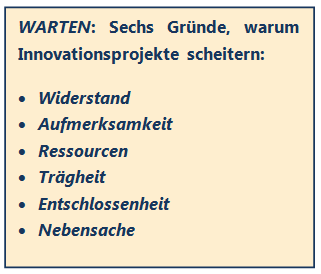von Jana Görs

Innovationen misslingen häufig
Jeder Innovations- oder Produktmanager ist bestrebt seine Innovationen zum Gelingen zu bringen. Bislang misslingen Innovationen immer noch häufig. Bei Zephram glauben wir, dass für den Erfolg oder Misserfolg einer Idee, die Umsetzungsart entscheidend ist. Warum? Weil eine Idee lediglich einen Kerngedanken einfängt. In den seltensten Fällen entspricht der erfolgreiche Dienst, das erfolgreiche Produkt oder das erfolgreiche Geschäftsmodell noch haargenau der ursprünglichen Idee.
Das Innovationsmanagement ist nicht gut vorbereitet auf radikale Ideen
Nun ist aber genau für diese Wandelbarkeit einer Idee der übliche Ansatz im Innovationsmanagement sehr schädlich, denn er begreift eine Idee als etwas nahezu fertiges, nur noch nicht ganz vollständig ausgearbeitetes: Aus einer Menge von Ideen werden typischerweise nur einige nach einem Stage Gate Process ausgewählt und anschließend als Projekt nach dem Wasserfallmodell umgesetzt. Der Misserfolg ist damit aber schon vorprogrammiert: Wird die Idee erst einmal in einen abgesegneten Plan gegossen, die Budgets für dieses Innovationsprojekt eingestellt, erfolgt die Umsetzung nahezu sklavisch nach diesem Plan, selbst wenn sich erste Misserfolge absehen lassen. Erst nach der Realisierung dieses Projekts wird es erneut in Frage gestellt und dort stellt man nicht selten fest, dass man in der Planung von ganz anderen Prämissen ausgegangen ist. Die Folgen ziehen nicht selten das Scheitern des Projekts mit sich bzw. teure Anpassungen. Mit dem Bewusstsein, dass eine Idee, und besonders radikale Ideen, noch sehr wandelbar sind, erscheint der übliche Innovationsmanagementansatz wie reine Geldverschwendung.
In der Ideenfindung fragen wir uns nun, wer hat solch ein Problem schon einmal gelöst, etwas noch Unreifes zum Erfolg zu bringen?
Lean Startup als Inspiration für Lean Innovation
Genau mit diesen Schwierigkeiten kämpften auch Startups, ganz besonders zu Zeiten der Dotcom-Blase, wo Millionen von Dollar an Startups verschwendet wurden – vor allem weil sie nach dem Wasserfallprinzip vorgegangen sind (z.B. Webvan). Eric Ries und Steve Blank entwickelten daher eine neue Methode, um Startups dabei zu helfen effizienter und schneller zum Geschäftserfolg zu kommen. Das Besondere an dieser Methode ist, dass sie die „Unreife“ einer Geschäftsidee direkt adressiert, indem sie zunächst nur als Hypothese betrachtet wird. Das bedeutet, dass uns unsere Idee nur eine Vermutung aufzeigt, welches Produkt zu welcher Zielgruppe passen könnte. Vom ersten Tag geht daher ein Lean Startup „raus“ und validiert ihre Geschäftsidee auf allen Geschäftsmodellebenen. Die Vorteile dadurch sind: eine schlechte Idee wird schnell entlarvt, Zeit wird nicht an einer perfekten aber marktlosen Produktentwicklung verschwendet und das Managementteam erhält Steuerungsmechanismen für die Geschäftsmodellentwicklung.
Lean Innovation Management als Lösung
Auch Steve Blank, schreibt einen Artikel darüber, wie Lean Startup nun auch Unternehmen dabei helfen kann schneller zu innovieren – er nennt es Lean Innovation Management. Blank beschreibt darin, dass Unternehmen schon sehr gut darin sind Verbesserungen an ihrem aktuellen Geschäftsmodell vorzunehmen, aber oft daran scheitern, größere Innovationssprünge zu unternehmen. Gerade bei radikalen Neuerung sind auch gestandene Unternehmen Neueinsteiger, die wie ein Startup mit Ungewissheiten umgehen müssen. Mit der Lean Startup Methode lässt sich die Erfolgswahrscheinlichkeit insbesondere für radikalere Neuerungen auch bei bestehenden Unternehmen erheblich steigern (z.B. neue Geschäftsmodelle, Produkterweiterungen).
Lean Innovation Management aus unserer Sicht
Wie das Innovationsmanagement von Lean Startup in unseren Augen profitieren kann:
- Es ist nichts sicher bei einer neuen Unternehmung, egal ob es sich dabei um eine Idee für ein gesamtes Geschäftsmodell, ein Produkt oder einen Service handelt.
- Statt aufwendige Business Pläne zu verlangen, nutze ein einfaches aber gut durchdachtes Geschäftsmodell als Entwicklungsgrundlage. Dadurch lassen sich auch wesentlich schneller Änderungen dokumentieren und kommunizieren.
- Behandle alle Faktoren in diesem Geschäftsmodell als Hypothesen. Kein Faktor ist validiert solange dort nicht ein Experiment Fakten geschaffen hat – nicht die erdachte Lösung, nicht das vermutete Problem der Zielgruppe, nicht einmal die Zielgruppe selbst.
- Überprüfe die Hypothesen konsequent. Für jede Hypothese braucht es ein Experiment, das die Hypothese belegt bzw. widerlegt. Die ersten wichtigen Hypothesen beziehen sich darauf, ob die Zielgruppe überhaupt die Lösung in Anspruch nehmen würde oder für die Lösung zahlen würde.
- Prüfe alle Hypothesen bis sie valide sind.
- Sind nicht alle Hypothesen validiert wurden, dürfen in die Unternehmung keine großen Investitionen fließen. Ausgaben in dieser Phase haben zum Ziel das Marktrisiko zu verringern. Es braucht daher nur so viel Investments, wie nötig sind, diese Risiken weitestgehend auszuräumen. Erst nach der Validierung werden große Mengen Geld für die Skalierung benötigt.
- Das Ziel dieser Etappe ist, wenn dann schnell zu scheitern. Das führt nämlich zu Gewissheit über die Erfolgswahrscheinlichkeit der Idee und senkt die damit verbundenen Kosten.
Unterschied Lean Startup und Innovation Management
Dazu braucht es allerdings einen extremen Wandel im Denken und Handeln von großen Unternehmen, um Lean Startup für sich einzusetzen. Hier zeigen wir, welche Unterschiede gerade existieren: Warum Konzerne sich immer noch schwer tun, zu innovieren?
Bildquelle: Stockvault
von Graham Horton
Some Tips for Startup Founders
I recently started to collect quotes about startups. While doing so, I realised that it would be quite fun to write down some of my own observations as well. However, it seemed a little irreverent to include my name among such well-known ones as Steve Blank and Paul Graham, so I decided to publish my thoughts separately.
Of course, these observations are drawn from my own experience, which is neither Silicon Valley nor a high-octane accelerator, but as a professor in Germany who has a small innovation consulting company, teaches entrepreneurship classes at university and occasionally coaches startups.
This post is a work in progress with no finishing deadline; I will continue to add observations as they occur to me.
Bureaucrats 1
Founders need to make mistakes as quickly as possible whereas bureaucrats want to avoid making even one mistake. So, when they are under pressure, startups will speed up and bureaucrats will do nothing. Therefore, founders should not allow themselves to become dependent on bureaucrats.
Attitude
Lots of students seem to think that founding a startup will be like any other job: that it can be pursued half-heartedly. The opposite is true: if you are not prepared to devote as much time and energy to your project as an olympic athlete or world-class musician, then it is doomed to failure.
Distractions
Events such as startup conferences and business plan competitions are held for the benefit of the hosts, not the founders. Better to ignore such distractions and spend the time making your product awesome.
Competition
The best definition of a competitor is, „Who will get our prospects‘ money if we don’t?“ Finding the right answer to this question is harder than it looks, but doing so will yield valuable insights into what your value proposition should be.
Ignorance
Nobody who has not themselves worked in a startup knows the first thing about them. Unfortunately, this often includes people that you need in order to get started, especially families, friends, banks, consultants, universities and the government.
Ancient Wisdom
Aristotle is supposed to have said, „Where your talents and the needs of the world cross, there lies your vocation.“ This is good advice for founders: Build something people want using the skills you are best at.
Bureaucrats 2
A bureaucrat’s job is to enforce rules, a startup’s job is to break rules. Therefore, startups and bureaucracies can never work together.
One Task Only
Your only task as an early-stage startup is to find a small network of customers who desperately need your solution and to make them insanely happy. If you can do that, then everything else will take care of itself.
Founder Roles
Until product-market fit, the only two roles a startup needs are someone who can create an awesome product and someone who can create a delighted customer.
Disappointment
Two unpleasant discoveries that all startup founders have to make: Their customers are not interested in their products, and their investors are not interested in their companies.
PSF and PMF
Product Market Fit means building the product correctly.
Problem Solution Fit means building the correct product.
von Graham Horton

Ein Startup ist ein Unternehmen, das schnell wachsen soll. Dabei sind die Ansprüche an die Wachstumsgeschwindigkeit außerordentlich hoch: Paul Graham spricht von 5% bis 7% pro Woche(!) Demzufolge ist nur ein sehr kleiner Anteil aller neu gegründeten Unternehmen in Wirklichkeit ein Startup.
Ich werde gelegentlich gefragt, woher diese Erfolgserwartung, die für die meisten Unternehmen niemals erreicht werden kann, kommt. Die Antwort liegt in der Art und Weise, wie Startups finanziert werden. Im Folgenden gebe ich das Beispiel wieder, das ich in meiner Vorlesung Startup Engineering 1 benutze.
Die Wahrscheinlichkeit, dass ein Startup scheitert, ist sehr hoch; Sie liegt bei etwa 90%. Um mit diesem außergewöhnlichen Risiko umzugehen, sind spezialisierte Finanzierungsunternehmen – die Venture Capital-Gesellschaften (VCs) – entstanden.
Dieses hohe Investitionsrisiko hat zwei Konsequenzen für die VCs. Erstens müssen sie ihr Geld streuen, indem sie sich an mehreren Startups beteiligen – sie bilden ein sogenanntes Portfolio. Zweitens erwarten die Geldgeber der VC-Gesellschaft eine Rendite, die deutlich höher liegt als bei sichereren Geldanlagen: VCs sollen typischerweise eine jährliche Rendite von 15% erzielen.
Nehmen wir zum Beispiel an, eine VC legt einen Fonds mit 100 Mio.$ auf, die eine Laufzeit von fünf Jahren hat. Sie will also am Ende dieser Zeit 1,15^5 * 100 Mio.$ erwirtschaftet haben. Das ist ziemlich genau 200 Mio.$. Sie investiert jeweils 10 Mio.$ in zehn Startups und erhält dafür in allen Fällen einen Unternehmensanteil von 50%.
Neun der zehn Startups scheitern, und 90 Mio. $ sind dadurch verloren. Der zehnte, erfolgreiche Startup muss also ganz allein die gesamte Gewinnerwartung seines Investors erfüllen. Er muss also einen Unternehmenswert von ungefähr 200 Mio.$ * 2 = 400 Mio.$ aufbauen. (Dem Investor gehört ja nur die Hälfte des Unternehmens.)
Die Gründer des erfolgreichen Startups haben also 10 Mio.$ erhalten und sollen damit ihr Unternehmen so schnell aufbauen, dass es nach fünf Jahren für (mindestens) 400 Mio.$ verkauft werden kann. Dies entspricht einer Vervierzigfachung(!) der ursprünglichen Investition.
Die Konsequenz aus dieser Situation ist, dass VCs nur in Startups mit einem außerordentlich großen Wachstumspotential investieren. Startups, die den Wert der Investition „nur“ verdoppeln oder verdreifachen, sind für sie uninteressant, oder gelten sogar als Misserfolge. Paul Graham sagt, Startup-Erfolg ist aus Investorensicht binär.
Eine weitere Konsequenz ist, dass das Startup nach etwa fünf Jahren einen sogenannten Exit machen muss: Entweder wird es an einen Konzern verkauft, oder es macht einen Börsengang. Nur so können die Investoren wieder ausgezahlt werden; Sie haben kein Interesse daran, das Unternehmen auf Dauer zu betreiben – ganz gleich wie profitabel es sein mag.
Link
Übersicht über die Beiträge für Startup-Gründer
von Graham Horton

Auch 2016 haben wir bei der Tagung HICSS in Hawaii über unsere Forschung berichtet. Bei mehr als 100 Einreichungen in unserem Themenbereich Collaboration Systems and Technologies haben wir den Best Paper Award – den Preis für den besten Beitrag – gewonnen. Den Juroren hat besonders gefallen, dass wir sowohl theoretisch gearbeitet als auch Experimente durchgeführt haben und dass wir daraus konkrete Empfehlungen für die Praxis ableiten konnten.
Wir haben über ein Forschungsergebnis auf dem Gebiet der Ideenbewertung und Ideenauswahl berichtet. Uns ging es darum, dass die sogenannte Nutzwertanalyse, die in vielen Unternehmen zur Bewertung und Auswahl von Innovationsideen eingesetzt wird, gravierende Nachteile hat. Wir haben in unserem Paper diese Nachteile beschrieben und eine alternative Methode vorgeschlagen, die diese Nachteile vermeidet.
Wir haben auch schon früher in diesem Blog die Nutzwertanalyse beschrieben und einige ihrer Nachteile gezeigt.
Dieses Jahr fand die Konferenz im Grand Hyatt Hotel auf Kauai statt. Kauai ist unsere Lieblingsinsel in Hawaii, und wir haben unterem anderem Wale gesehen, eine Kaffeeplantage besucht, einen Rundflug gemacht und beim Schnorcheln in der Pazifik den Humuhumunukunukuapua’a – den Staatsfisch von Hawaii – beobachtet.
Links
Unser Paper Graham Horton, Jana Goers, Stefan Werner Knoll: How Not to Select Ideas for Innovations: A Critique of the Scoring Method (DOI: 10.1109/HICSS.2016.37 Conference: 49th Hawaii International Conference on System Sciences, At Grand Hyatt, Kauai, Hawaii, USA)
von Graham Horton
Der Innovationsprozess
Für viele Unternehmen werden die Lebenszyklen ihrer Produkte immer kürzer, und es drängen immer mehr Wettbewerber in ihre Märkte. Um zu überleben müssen sie also kontinuierlich neue oder verbesserte Angebote einführen, ihre Produktivität erhöhen und ihre Geschäftsmodelle optimieren. Kurz: Sie brauchen Innovationen.
Um einen zuverlässigen Strom an Innovationen sicherzustellen, betreiben Konzerne und große Mittelständler einen Innovationsprozess, der eines oder mehrere Innovationsprojekte umfassen kann. Dieser Prozess kann zwar unterschiedliche Formen annehmen, aber allen Varianten ist gemeinsam, dass sie mit einer Ideenphase beginnen. Ziel dieser Ideenphase ist, ausgearbeitete und bewertete Vorschläge zu produzieren, die sich als Entscheidungsvorlage für die Geschäftsleitung eignen. Die Ideenphase kann in vier Schritte unterteilt werden, die jeweils durch einen Innovationsworkshop erreicht werden können.
Der Innovationsworkshop
Ein Innovationsworkshop ist ein moderiertes Meeting, das zum Ziel hat, einen bestimmten Meilenstein der Ideenphase zu erreichen. Die Workshops können je nach Bedarf sehr unterschiedliche Formen annehmen: Eine kleine Veranstaltung dauert beispielsweise nur einen halben Tag und hat drei bis vier Teilnehmer, ein großer Ideenfindungsworkshop dagegen kann mehr als 50 Personen umfassen und sich über zwei Tage erstrecken.
Die Teilnehmerauswahl ist sehr wichtig: Jede relevante Perspektive sollte vertreten sein. Für eine Geschäftsmodellinnovation bedeutet dies vor allem der Business Development Manager und die Geschäftsleitung, für Produktinnovation braucht es Entwicklungsingenieure und Marketing-Experten und für Produktivitätssteigerung sind Produktionsleiter und Vorarbeiter unerlässlich.
Der gesamte Prozess wird von einem Innovationsexperten betreut, der auch die Workshops vorbereitet und moderiert. Große mittelständische Unternehmen und Konzerne leisten sich hierfür einen Innovationsmanager, es stehen aber auch unabhängige Dienstleister wie Zephram als Prozessbegleiter zur Verfügung.
Vier Arten von Workshop
 Die erste Grafik zeigt die vier Stationen der Ideenphase eines Innovationsprozesses. Zunächst müssen die Innovationsziele und Rahmenbedingungen festgesetzt werden. Beispiele für Innovationsziele sind: Umsatz steigern, neue Produktgeneration entwickeln oder Kosten senken. Zu den Rahmenbedingungen gehören Fragen wie Ressourcen, Zuständigkeiten oder nicht zulässige Suchfelder.
Die erste Grafik zeigt die vier Stationen der Ideenphase eines Innovationsprozesses. Zunächst müssen die Innovationsziele und Rahmenbedingungen festgesetzt werden. Beispiele für Innovationsziele sind: Umsatz steigern, neue Produktgeneration entwickeln oder Kosten senken. Zu den Rahmenbedingungen gehören Fragen wie Ressourcen, Zuständigkeiten oder nicht zulässige Suchfelder.
Im zweiten Schritt erfolgt die Ideenfindung. Sie berücksichtigt eine Vielzahl von Quellen und Anregungen, zum Beispiel Kundenwünsche, Markttrends oder Aktivitäten von Wettbewerbern. Das Ergebnis der Ideenfindung sind typischerweise 40 bis 400 Ideen.
Im dritten Schritt werden die Ideen ausgearbeitet und evaluiert. Hier können auch schon erste Rechercheergebnisse einfließen. Ergebnis dieses Meilensteins ist eine stark verkürzte Liste von Favoritenideen (typischerweise 10 bis 20), die bezüglich aller entscheidenden Kriterien bewertet worden sind. Das Ziel dieses Meilensteins ist, eine fundierte Auswahl zu ermöglichen.
Im vierten und letzten Meilenstein werden die Ideen ausgewählt, die weiter verfolgt werden sollen. Bei kleinen Projekten werden nur zwei oder drei Ideen gesucht, aber wir hatten auch Projekte, wo mehr als 15 Ideen in die Entwicklungsphase gekommen sind.
Alle vier Meilensteine der Ideenphase sind unerlässlich – sonst ist die Gefahr groß, gute Ideen nicht zu entdecken oder eine sub-optimale Auswahl zu treffen. Das Format der Workshops kann dabei stark variieren: Eine Ideenfindung hat zum Beispiel meistens viele Teilnehmer, um möglichst viele verschiedene Perspektiven zu bekommen. Die Zielsetzung und die Ideenauswahl dagegen werden meistens nur von einem kleinen Management-Team vorgenommen.
Wann ist ein Innovationsprojekt richtig? Die 4P-Checkliste
Wir haben eine Checkliste entwickelt, die wir „4P“ nennen. Sie hilft, die Frage zu klären, ob ein Innovationsworkshop für ein Unternehmen gerechtfertigt ist oder nicht. Drei der vier „P“s betreffen Innovationsziele, und das vierte „P“ betrifft die Fähigkeit und die Bereitschaft, das Notwendige zu tun, um den gewünschten Nutzen aus dem Projekt zu holen.
Die drei „Ziel-P“s lauten:
Position: Innovation soll dazu genutzt werden, um die Position im Markt zu stärken. Dies könnte zum Beispiel bedeuten, Patente anzumelden, Qualitäts- oder Technologieführerschaft auszubauen oder eine Kundenbeziehung zu intensivieren.
Profit: Das Innovationsprojekt soll helfen, die Unternehmensbilanz zu verbessern. Das Ziel könnte beispielsweise sein: Umsatzsteigerung durch Diversifizierung, Erhöhung des Kundennutzens bei einem bestehenden Produkt oder neue Ergänzungs- und Zusatzangebote zu entwickeln.
Productivity: Es werden Innovationen am Arbeitsprozess gesucht, um Kosten zu senken, Produktivität zu verbessern oder Ergebnisqualität zu erhöhen.
Es ist wichtig, genau zu klären, welchem Ziel das Innovationsprojekt dienen soll und welche Faktoren dabei eine Rolle spielen. Es macht beispielsweise einen großen Unterschied, ob Innovationen an einem Produkt gesucht werden, weil Umsatzwachstum angestrebt wird, ihm die Commoditisierung droht, oder das Ende seines Lebenszyklus bald bevorsteht. Der Projektverantwortliche muss diese Hintergründe kennen, um den Innovationsprozess zu gestalten und erfolgreiche Workshops vorbereiten zu können.
Das vierte „P“ nennen wir Priority; Damit ist die Priorität gemeint, die das Unternehmen bereit ist, dem Innovationsprojekt zu geben. Nach unserer Erfahrung unterschätzt fast jedes Unternehmen, das keinen fest etablierten Innovationsprozess besitzt, die Schwierigkeiten eines Innovationsprojektes. Eine zu geringe Priorität führt dann fast unweigerlich dazu, dass das Projekt vernachlässigt wird und dadurch eine Verzögerung erlebt oder sogar scheitert.
Das vierte „P“ und die typischen Innovationsprojekt-Probleme
Innovationsprojekte sind anspruchsvoll. Bei Unternehmen mit einer starken Innovationskultur läuft der Innovationsprozess fast von alleine, die anderen müssen dies durch die Vergabe einer hohen Priorität kompensieren. Dadurch stellen sie sicher, dass die Geschäftsleitung das Projekt mit ausreichender Autorität ausstattet und mit dem notwendigen Nachdruck vorantreibt.
Die wichtigsten Gefahren eines Innovationsprojektes kann man sich mit dem Akronym WARTEN gut merken, denn Warten ist genau das, was es für das Innovationsprojekt zu vermeiden gilt!
 Widerstand. Die innerbetrieblichen Widerstände gegen Innovationsprojekte können enorm hoch sein. Mitarbeiter, deren Arbeitsinhalte sich dadurch ändern oder Vorgesetzte, die ihre Machtposition dadurch bedroht sehen, können versuchen, das Projekt zu vereiteln.
Widerstand. Die innerbetrieblichen Widerstände gegen Innovationsprojekte können enorm hoch sein. Mitarbeiter, deren Arbeitsinhalte sich dadurch ändern oder Vorgesetzte, die ihre Machtposition dadurch bedroht sehen, können versuchen, das Projekt zu vereiteln.
Aufmerksamkeit. Innovationsprojekte brauchen in den Anfangsphasen viel Aufmerksamkeit von der Geschäftsleitung und stecken dadurch in einer schwierigen Konkurrenzsituation mit anderen wichtigen Themen. Erhalten sie die notwendige Zuwendung nicht, ist die Gefahr groß, dass sie verhungern und sterben.
Ressourcen. Wie jedes andere Projekt braucht auch ein Innovationsprojekt Ressourcen. Eine Besonderheit der Innovation ist dass Mitarbeiter vieler Abteilungen benötigt werden. Die jeweiligen Abteilungsleiter müssen bereit sein, die angeforderten Mitarbeiter für ein „fremdes“ Projekt zeitweise freizugeben.
Trägheit. Innovation bedeutet automatisch, das Bestehende zu verändern. Auf der anderen Seite steht die natürliche Trägheit von Organisationen, die Neuerungen entgegensteht. Dabei handelt es sich nicht einmal um aktiven Widerstand – althergebrachte Regeln und Denkweisen reichen oft schon, um Innovationsinitiativen für Wochen oder Monate zu verzögern.
Entschlossenheit. Innovation bedeutet auch fast immer, Risiken einzugehen und Entscheidungen mit hoher Ungewissheit treffen zu müssen. Ab einem gewissen Punkt in der Evaluationsphase (der oft schnell erreicht ist) führen weitere Recherchen nur noch zu „Paralyse durch Analyse“.
Nebensache. Ein Innovationsprojekt braucht die Mitwirkung vieler in einer Organisation. In einer durchschnittlichen Unternehmenskultur nehmen es die meisten Betroffenen allerdings nur als eine Ablenkung von ihren eigentlichen Hauptaufgaben wahr. Die Gefahr ist damit groß, dass es vernachlässigt wird und dadurch an Qualität oder Tempo einbüßt.
Leider haben wir nur allzu oft erlebt, wie ein Innovationsprojekt aus WARTEN-Gründen gescheitert oder erheblich verzögert worden ist oder minderwertige Ergebnisse produziert hat. In einem Fall lagen die Ergebnisse einer Ideenfindung für neue Produkte mehr als ein Jahr in der Schublade eines Innovationsmanagers, bis wir das Unternehmen dazu bringen konnten, ein Projekt daraus zu machen. Die Geschäftsidee ist inzwischen erfolgreich als Tochterunternehmen gestartet. Scheitert ein Innovationsprojekt, ist das Thema Innovation in der Organisation fürs Erste verbrannt, und es wird umso schwieriger, Management und Mitarbeiter für das nächste Projekt wieder zu motivieren.
Fazit
Innovation ist für nahezu jedes Unternehmen unerlässlich, denn nur dadurch kann die Wettbewerbsfähigkeit erhalten werden. Die Herausforderungen bei einem Innovationsprojekt sind groß, und sie scheitern oft schon früh an Management-Versagen statt später an unvorhergesehenen technologischen Problemen oder Marktfaktoren. Nur wenige Unternehmen haben einen dauerhaft betreuten Innovationsprozess – für alle anderen ist es wichtig, zu prüfen, ob der Anlass für ein Innovationsprojekt gegeben ist, die potentiellen Probleme bekannt sind und die Bereitschaft vorhanden ist, ihm die notwendige Priorität zu geben. Werden die Voraussetzungen dagegen geschaffen, so werden die Erfolgschancen für das zukünftige Produkt oder Geschäftsmodell dramatisch erhöht.
von Graham Horton

Der Workshop für Produktverbesserungsideen
Produktinnovation ist das häufigste Workshop-Thema für Zephram. Unsere Kunden suchen entweder ganze neue Produkte oder Dienstleistungen, oder sie brauchen Verbesserungen für ihr bestehendes Portfolio. Im ersten Fall verfolgen sie das Ziel einer Diversifikation (oben rechts in der Ansoff-Matrix), im zweiten Fall wollen sie ihre Marktposition verteidigen. Gerade für einen Marktführer ist es wichtig, die Innovationspipeline gefüllt zu halten, um sicherzustellen, dass sein Produkt im Markt immer vorne ist. Dazu dient ein Workshop für Produktverbesserungsideen.
In diesen Innovationsworkshops setzen wir fast immer Checklisten oder Flashcards ein, weil wir auf diese Weise konzentriertes Expertenwissen aus der Produktentwicklung in den Workshop einfließen lassen können. Ein Anwendungsfall, bei dem dieses Vorgehen besonders gut funktioniert, sind Verbesserungen für technische Produkte: Die Checklisten enthalten Anregungen zur Modifikation und Verbesserung, die sich über viele Jahre bewährt haben. Darin ähneln sie den 40 Prinzipien von TRIZ, die ebenfalls Anregungen für Produktverbesserungsideen sind.
Die Flashcard-Themen
Unser Kartensatz umfasst die 10 wichtigsten Ansätze zur Suche nach Produktverbesserungsideen. Sie heißen…
- Ablauf
- Anordnung
- Dimension
- Ersatz
- Information
- Reibung
- Überflüssig
- Wahl
- Zeitverlust
- Zuordnung
Diese Überschriften sind sehr abstrakt und nutzen in der Form recht wenig (Reduzieren Sie die Reibung! Nutzen Sie Information besser!) Darum enthält jede Karte Unterthemen, die die Überschriften konkretisieren. Die Titelgrafik zeigt beispielweise die Karte Anordnung mit einer Erläuterungsfrage und einigen Unterthemen (Effizienteres Layout, Plätze tauschen, …). Auch diese Unterthemen sind oft immer noch zu abstrakt, um bei den Workshop-Teilnehmern Ideen auszulösen. Dies ist dann Aufgabe des Moderators, der sich genügend auskennen muss, um die Unterthemen mit Fragen und Beispielen ausschmücken zu können.
Beispiel
Das Beispiel in der Titelgrafik ist die Flashcard Anordnung. Diese Anregung kann auf vielerlei Weise interpretiert werden, zum Beispiel die zeitliche Reihenfolge von Ereignissen oder die relative Position von Komponenten. Es ist Aufgabe des Moderators, ausgehend von dieser Karte Fragen zu stellen wie…
- Welche Komponenten könnten wir vertauschen?
- Können wir das Layout effizienter anordnen, um Strecken zu verkürzen?
- Können wir eine Aktivität zeitlich vorziehen, um einen Leerlauf auszunutzen?
- Welche Komponenten sollten näher zusammenstehen?
- Können wir durch Neuausrichtung einen Richtungswechsel vermeiden?
- Können wir Zugriffszeiten verringern, indem wir oft benötigte Sachen näher rücken?
Kommentar
Die Verbesserung von technischen Produkten ist eine alte, etablierte Aufgabe, für die schon viel Lösungswissen vorliegt. Dieses Fachwissen kann man in Flashcards oder Checklisten unterbringen für den Einsatz in einem Innovationsworkshop. Allerdings ist viel Erfahrung seitens des Moderators nötig, um den größtmöglichen Nutzen aus den Anregungen zu holen. Beim obigen Beispiel Anordnung ist der Clou an der Sache nicht die Anregung an sich, sondern der Zweck, den man mit ihr anstrebt: Es ist ein großer Unterschied, ob man lediglich fragt, Welche Komponenten könnten wir neu ausrichten? oder (besser): Können wir durch die Neuausrichtung einer Komponente einen Richtungswechsel vermeiden?
Wir haben mit Hilfe dieses Kartensatzes schon viele Erfolge gehabt – ein Kunde von uns nutzt sie beispielsweise regelmäßig, um Ideen für Patente zu entwickeln.
von Graham Horton

Es hat sich inzwischen herumgesprochen, dass Innovation für jedes Unternehmen überlebenswichtig ist. Ausnahmen gibt es nur, wenn die Freiheit des Marktes aufgehoben ist und dadurch kein Wettbewerbsdruck vorhanden ist – wie beispielsweise beim Öffentlichen Dienst. Für alle anderen gilt aber: Wer nicht innoviert, wird früher oder später von der Konkurrenz überholt. Darauf hat Bundespräsident Roman Herzog schon 1997 in seiner berühmten Ruck-Rede hingewiesen mit den Worten: Die Fähigkeit zur Innovation entscheidet über unser Schicksal.
Viele Unternehmen präsentieren sich gern als innovativ – das Wort erscheint in zahlreichen Webseiten und Jahresberichten. Geschäftsführer betonen gern, dass Innovation in ihrer Organisation eine hohe Priorität genießt, und Politiker rund um die Welt stellen in ihren Reden die Innovation in den Mittelpunkt ihrer Programme.
Nur leider ist es oft nicht so weit her mit der hohen Priorität. Wir von Zephram erleben es immer wieder, dass beschlossene oder sogar bereits begonnene Innovationsprojekte aufgegeben oder auf unbestimmte Zeit verschoben werden. Manchmal sind die Gründe hierfür nachvollziehbar – es gibt nun manchmal Notfälle, die die Planung zerstören. Viel öfter ist es aber der Fall, dass die Innovation einer politischen Entscheidung zum Opfer fällt oder das Tagesgeschäft sie einfach verdrängt.
In vielen Fällen ist die Erklärung dafür einfach: Innovationsprojekte befinden sich im Quadrant II des Eisenhower-Diagramms (siehe Titelgrafik). Dass die Innovation für ein Unternehmen wichtig ist, ist allgemein bekannt, nur leider ist sie nicht dringend – es brennt (heute) nichts an, wenn man heute nichts dafür tut. Damit fällt sie leicht dem Tagesgeschäft zum Opfer.
Wir haben hier die „besten“ Gründe für den Aufschub von Innovationsprojekten gesammelt. Alle Beispiele stammen aus unserer eigenen Erfahrung.
Die Abteilungen werden bei uns gerade umorganisiert.
Ich bekomme keinen Termin dafür bei der Geschäftsleitung.
Die Kollegen sind müde von der letzten Besprechung. Vielleicht können wir das Projekt in sechs Monaten machen.
Mein Chef hat mich auf ein anderes Projekt gesetzt. Zur Zeit steht das Innovationsmanagement bei uns still.
Die Geschäftsführung hat das Thema einfach von der Tagesordnung runtergenommen.
Wir haben im Moment so viele Kundenanfragen, dass wir keine Zeit für Innovation haben.
Unser Geschäftsführer hat gerade gewechselt. Er hat erst einmal alle Projekte seines Vorgängers auf Eis gelegt.
Dieses Jahr sind andere Themen wichtiger.
Der arme Innovationsmanager oder Produktmanager kann einem richtig leidtun – er wird von seiner Organisation für die Innovation verantwortlich gemacht, aber seine Bemühungen werden ständig torpediert.
Kunden, denen diese Gefahr bewusst ist, beauftragen uns nicht nur, um den einen oder anderen Innovationsworkshop durchzuführen, sondern dass wir uns um das Innovationsprojekt insgesamt kümmern. Wir werden zu Innovationsmanagern auf Zeit, die für die Dauer eines Innovationsprojektes dafür sorgen, dass dass die Ideen bis zur Entscheidung weiterentwickelt werden. Dabei haben wir als Außenstehende sogar einen gewissen Vorteil, denn wir dürfen mehr nörgeln und an Termine erinnern, als es ein Mitarbeiter vielleicht kann.
von Graham Horton

Anregungen im Innovationsworkshop
Eine Besonderheit unserer Innovationsworkshops sind unsere individuellen Drehbücher. Für jede Aufgabe setzen wir eigens entwickelte Werkzeuge ein, die inhaltlich für die jeweilige Aufgabenstellung maßgeschneidert sind – ganz gleich, ob es sich um die Sensibilisierung, die Ideenfindung oder die Ideenbewertung handelt.
In der Praxis gibt es eine Reihe immer wiederkehrender Aufgaben. Dazu gehören Ideenfindung für Produktinnovation, Geschäftsmodellinnovation, Namensfindung, Produktivitätssteigerung und Kostensparen. Für diese und weitere Themen haben wir die besten Anregungen in Form von Checklisten und Flashcards vorbereitet, die immer wieder zum Einsatz kommen. Wir haben inzwischen schon mehr als 30 verschiedene Kartensätze auf Lager, die für alle häufige vorkommenden Innovationsaufgaben verwendet werden können. In diesen Dokumenten stecken 10 Jahre Erfahrung in Moderation und Innovationsmanagement.
Flashcards
Eine Flashcard ist eigentlich eine Lernhilfe für Kinder. Fragen zu einem bestimmten Thema werden einzeln auf die Kartenvorderseiten geschrieben, und die Antworten kommen auf die jeweiligen Rückseiten. Die Karten können dann nacheinander gezogen werden wie bei einem Kartenspiel, und die jeweilige Frage wird beantwortet und die Antwort kontrolliert.
Wir setzen Flashcards anders ein. Jede Karte trägt eine Anregung zur Ideenfindung – gegebenenfalls um weitere Informationen ergänzt. Die Kartenrückseiten brauchen wir nicht. Der Team-Moderator zeigt die Karten nacheinander seinem Team ähnlich dem Croupier im Casino. Er verweilt solange bei einer Karte, bis dem Team nichts mehr dazu einfällt und geht dann zur nächsten Karte über. Manchmal können die Experten mit einer Karte nichts anfangen – in diesem Fall muss der Team-Moderator Hilfestellung leisten können, indem er die Bedeutung des Karteninhalts erläutert und Beispiele liefert. Fruchtet auch dies nicht, wird die Karte einfach verworfen.
Manche unserer Kartensätze umfassen um die 50 Karten (die größte hat mehr als Hundert!), andere dagegen weniger als zehn. Ein guter Moderator kann eine mehrstündige Ideenfindung allein mit Hilfe eines einzigen Kartensatzes durchführen.
Beispiele
Grundsätzlich kann jede Checkliste auch in Form von Flashcards inszeniert werden. Die Entscheidung obliegt bei uns immer dem Drehbuchautor während seiner Workshopvorbereitung.
- Eine sehr häufig auftretende Workshopaufgabe bei uns ist die Prozessverbesserung; unsere Kunden suchen Möglichkeiten, ihre Produktivität zu erhöhen und um Kosten zu senken. Die 16 Ansätze zur Prozessoptimierung haben wir als Flashcards realisiert.
- Zur Sensibilisierung setzen wir vor der Ideenfindung zur Prozessoptimierung Flashcards ein, die den Teilnehmern helfen, Engpässe im Arbeitsprozess zu identifizieren.
- Für die Geschäftsmodellinnovation haben wir einen sehr umfangreichen Kartensatz entwickelt, der mehr als 100 Anregungen enthält. Dieser Kartensatz reicht für einen ganzen Tag!
- Ein zweiter, sehr umfangreicher Kartensatz bechreibt die verschiedenen Arten von Kundennutzen. Die Karten sind in den sieben PERFECT-Kategorien organisiert, und jede Kategorie enthält 7 bis 10 einzelne Anregungen bzw. Beispiele.
- Unsere 100 Mr. Xe haben wir natürlich auch in Form von Flashcards verwirklicht. Die analoge Liste von Unternehmen genauso.
Kommentar
Flashcards sind eine einfache und wirksame Inszenierung von Checklisten. Sie bringen Abwechslung in die Ideenfindung und können sowohl Texte als auch Bilder enthalten. Durch die Nähe zu Kartenspielen kann der Moderator auch Spiel-ähnliche Varianten durchführen.
Das Wichtige an Flashcards (und Checklisten) ist das darin enthaltene Innovationswissen. Um die Inhalte bereitstellen zu können, muss man natürlich über entsprechende Fachkenntnisse verfügen. Die Flashcards von Zephram enthalten unser kondensiertes Wissen aus 10 Jahren Innovationsworkshops für die verschiedensten Auftraggeber. Dies bildet eine wichtige Komponente unseres Wettbewerbsvorteils gegenüber anderen Workshopanbietern.
Die Moderation einer Flashcard-Technik ist sehr anspruchsvoll. Es genügt nicht, einfach die Karten nacheinander aufzudecken, sondern der Moderator muss dazu imstande sein, jede Karte zu erläutern und Beispielen dafür zu liefern. So muss er beispielsweise beim Kartensatz für Prozessverbesserungen nicht nur erklären können, was ein Medienbruch ist, sondern spontan Hilfestellungen liefern wie…
- Wann muss etwas abgeschrieben oder kopiert werden?
- Wann muss das Dateiformat gewechselt werden?
- Wann ist etwas unverständlich?
- Wann muss etwas umgelagert oder neu sortiert werden?
- Wo sind bei Ihnen zwei Systeme inkompatibel?
Dies sind alle Beispiele oder Analogien für Medienbrüche, wie sie in Arbeits- und Produktionsprozessen häufig vorkommen.
Die Fähigkeit, zu jeder Flashcard solche Hilfestellungen geben können, bildet eine wietere wichtige Komponente unseres Alleinstellungsmerkmals.
von Graham Horton

Pump, Jump und Dump
Das allererste Ergebnis unserer Idea Engineering-Forschung vor zehn Jahren war die Erkenntnis, dass es im Grunde nur drei verschiedene Arten von Perspektivwechsel gibt, um Ideen zu produzieren. Nahezu alle Methoden („Kreativitätstechniken“), die man in zahlreichen Büchern und Webseiten findet, können auf einen dieser drei Ansätze (oder einer Kombination daraus) reduziert werden. Dicke Bücher wie VanGundys 101 Activities for Teaching Creativity and Problem Solving werden plötzlich viel übersichtlicher, wenn man erkennt, dass es praktisch nur eine Vielzahl von Varianten dieser drei Arten von Anregung enthält.
Seit nunmehr 10 zehn Jahren unterrichte ich diese drei Ansätze im Kurs Idea Engineering an der Universität Magdeburg, und einige Hundert Absolventen des Kurses haben diese Ansätze in Studium und Beruf eingesetzt. Wir nennen sie Pump, Jump und Dump, damit die Studenten sie sich leichter merken können 😉
Jump
Jump (springen) bezeichnet die Perspektivwechsel, die ein fremdes Konzept direkt verwenden: die Aufmerksamkeit „springt“ von der Aufgabenstellung zu einem anderen Ort. Dieser Sprung kann entweder bewusst gesteuert sein oder dem Zufall überlassen werden. Im letzteren Fall erhält man die so genannten Zufallstechniken.
Viel effektiver sind aber die Jump-Methoden, die sorgfältig ausgewählte Sprungziele verwenden. Zu diesen zählt vor allem die Analogietechnik, die Situationen betrachtet, die mit der Aufgabenstellung verwandt sind. Sucht man beispielsweise Ideen, wie man eine Dorfsparkasse beliebter machen kann, könnte man sich die Frage stellen, wie dies die Kirche, die Stammkneipe oder die Bäckerei machen würden bzw. bereits erreicht haben.
Dump
Oft wird das Finden neuer Ideen durch bestehende Glaubenssätze und Annahmen behindert. Für solche Fälle gibt es den Perspektivwechsel Dump (Wegwerfen). Beim Dump stellt man die eigenen Annahmen oder die eigenen Erfahrungswerte in Frage, um neue Perspektiven zu gewinnen. Das Dump kommt den Provokationen von Edward de Bono sehr nahe, ist aber präziser definiert. Eine alternative Bezeichnung für Dump ist Annahmen aufheben.
Beispiele für Dump sind:
- Jeder, der traurig ist, trägt ein gelbes Hemd.
- Dienstags heißen alle Polizisten Stefanie.
- Kinder haften für ihre Eltern.
Pump
Die Kategorie Pump (aufpumpen) findet nur selten Erwähnung. Dabei ist sie noch naheliegender als das Dump. Sie bezeichnet die Analyse der Ideenfindungsaufgabe durch Nennung von Details. Der Name soll erinnern an das aufpumpen eines Luftballons, wodurch Details auf der Oberfläche sichtbar werden. Eine andere Metapher ist eine Lupe oder die Zoom-Funktion einer Kamera. Pump-Methoden werden oft mit Hilfe von Checklisten durchgeführt.
Pump bedeutet oft nichts anderes als die Verwendung von Fachwissen, um ein Problem zu lösen. Sucht man beispielsweise Ideen für Produktverbesserungen, bietet es sich an, die verschiedenen Arten von Kundennutzen zu betrachten (denn zu einer Produktverbesserung gehört immer eine Erhöhung des Kundennutzens).
Ein allgemeiner Ansatz, um eine Aufgabenstellung zu analysieren, ist unsere 8P-Technik. Ein „Aufpumpen“ eines Supermarktes ergibt z.B.
- People (Menschen): Kassierer, Kinder, Senioren, …
- Places (Orte): Kasse, Eingang, Parkplatz, …
- Problems (Probleme): Ware verdorben, lange Wartezeiten, Ware ist ausverkauft, …
- Processes (Abläufe): Schlange stehen, Ware suchen, Tasche packen, …
- usw.
Die einzige weit verbreitete Pump-Methode ist die Osborn- bzw. SCAMPER-Checkliste, die bewährte Ansätze zur Modifikation eines Konzeptes enthält.
(Freies) Brainstorming
Die am häufigsten verwendete Arte von Ideenfindung ist gar nicht unter Pump, Jump und Dump zu finden, nämlich das klassische (freie) Brainstorming mit all seinen Varianten. Beim Brainstorming wird nämlich überhaupt kein Perspektivwechsel angeboten – die Teilnehmer sind auf sich alleine gestellt. Rund die Hälfte aller Methoden in VanGundys Buch sind von dieser Art – das traditionelle Brainstorming, die Galerie- und 635-Technik, Brainwriting, Brainwriting Pool usw.
Wie wir in diesem Blog bereits mehrfach erwähnt haben, kann eine Ideenfindung nur dann effektiv sein, wenn den Workshop-Teilnehmern gute Anregungen angeboten werden. Aus dem Grund setzen wir Brainstorming und seine vielen Geschwister niemals ein, wenn unsere Klienten innovative Ideen suchen, denn wir wollen es nicht dem Zufall überlassen, ob eine gute Idee entsteht oder nicht.
Fazit
Wer Pump, Jump und Dump kennt, braucht sich nie mehr um Kreativitätstechniken Gedanken zu machen. Wenn man die drei Prinzipien versteht, kann man sie effektiv moderieren, ganz gleich in welcher speziellen Gestalt sie durchgeführt werden mögen. Dann ist es beispielsweise egal, ob die Dump-Technik als König und Hofnarr, als Tag der offenen Tür oder als Fernsehquiz inszeniert wird, denn das zugrunde liegende Prinzip ist immer gleich.
von Graham Horton

Ideenbewertung in der Gruppe
Ideen werden fast immer von Gruppen bewertet. Entweder am Ende eines Innovationsworkshops oder in einem dedizierten Bewertungsworkshop sitzen Experten zusammen, um gemeinsam aus einer Menge von Ideen die besten zu identifizieren.
Entgegen der Erwartung vieler Kunden ist die Bewertung von Ideen viel schwieriger als das Generieren. Viele der Schwierigkeiten der Ideenbewertung entstehen, weil eine Gruppe beteiligt ist.
Es ist fast unvermeidlich, dass es in einer Gruppe zu abweichenden Urteilen der Gruppenmitglieder kommt. Eine Ursache dafür sind die versteckten Profile – unterschiedliche Vorstellungen von der selben Sache. Der Moderator oder Innovationsmanager hat dann das Problem, dass er die verschiedenen Urteile zusammenführen muss, um zu einem Gesamturteil zu kommen. selbst bei dieser scheinbar sehr einfachen Aufgabe kann man schwerwiegende Fehler machen, zum Beispiel indem man die Urteile in der falschen Reihenfolge aggregiert.
In diesem Artikel beschreiben wir einen subtilen Fehler der Gruppenideenbewertung, der sehr häufig begangen wird. Das Argument ist zwar theoretisch, hat aber unmittelbare praktische Konsequenzen. Die Erkenntnis ist im Rahmen unserer Idea Engineering-Forschung mit der Universität Magdeburg zusammen entstanden.
Aggregation von Urteilen bei der Gruppenideenbewertung
Fast immer wird für die Bewertung von Ideen eine Art von Punktevergabe verwendet. Im Innovationsmanagement wird beispielsweise die Nutzwertanalyse gerne eingesetzt, bei der den Ideen Punkte auf einer Skala von 1 bis 5 oder 1 bis 10 gegeben werden.
In einer Gruppe hat der Moderator zwei Möglichkeiten: entweder die Gruppe einigt sich auf die Punkte, die vergeben werden, oder die Mitglieder vergeben ihre Punkte alleine, und sie werden dann hinterher rechnerisch zusammengeführt. Findet die Bewertung räumlich oder zeitlich getrennt statt, bleibt nur die zweite Option.
Mittelwert und Median
Um verschiedene Punktzahlen zu einem Gesamturteil zusammenzuführen greifen die meisten Menschen zum (arithmetischen) Mittelwert (engl.: Mean). In der Titelgrafik zeigen wir ein Beispiel mit den fünf Experten A, B, C, D und E, die eine Idee mit 1, 1, 2, 5 bzw. 5 Punkten bewertet haben. Das arithmetische Mittel dieser fünf Bewertungen ist (1+2+2+5+5)/5 = 3.
Eine Alternative zum Mittelwert ist der Median. Der Median einer Menge von Zahlen ist definiert als diejenige, die in der Mitte steht, wenn alle Zahlen der Größe nach aufgereiht werden. Der Median der fünf Expertenbewertungen 1, 2, 2, 5, 5 in der Titelgrafik ist demzufolge die 2.
Das Argument für den Median
Wie zeigen nun ein theoretisches Argument, das gegen die Verwendung des arithmetischen Mittelwertes und für den Median spricht.
Ein Ziel der Gruppenideenbewertung ist, unter den Teilnehmern Konsens über das Endergebnis zu erzielen. Wir können den Konsens prüfen, indem wir in einem Gedankenexperiment eine Wahl durchführen, bei der jedes Einzelurteil jedem anderen Einzelurteil gegenübergestellt wird und die Experten darüber abstimmen, welchem Einzelurteil sie den Vorzug geben. Das Einzelurteil, das auf diese Weise die meisten Stimmen erhält, ist dann das aggregierte Gruppenergebnis.
Man kann relativ leicht mathematisch beweisen, dass der Median von allen Einzelurteilen dasjenige ist, das diese Wahl immer gewinnt. Es gibt zwar Fälle, in denen das arithmetische Mittel mit dem Median übereinstimmt und damit auch zum Mehrheitsergebnis führt, aber im allgemeinen werden die beiden Mittelwerte unterschiedlich sein.
Beispiel
Die Titelgrafik zeigt das bereits beschriebene Beispiel mit den fünf Bewertungen 1, 2, 2, 5 und 5, mit arithmetischem Mittel 3 und Median 2.
Die Tabelle zeigt die Stimmen für jeden paarweisen Vergleich. Wir lesen zum Beispiel als Antwort auf die Frage Wie viele Experten ziehen den Wert 2 dem Wert 1 vor? die Zahl 4. Das Ergebnis kommt wie folgt zustande:
- Experte A, der mit 1 bewertet hat, zieht den Wert 2 dem Wert 1 nicht vor.
- Experte B, der mit 2 bewertet hat, zieht den Wert 2 dem Wert 1 vor.
- Experte C, der mit 2 bewertet hat, zieht den Wert 2 dem Wert 1 vor.
- Experte D, der mit 5 bewertet hat, zieht den Wert 2 dem Wert 1 vor.
- Experte E, der mit 5 bewertet hat, zieht den Wert 2 dem Wert 1 vor.
Bildet man die Zeilensummen der Tabelle, erkennt man, dass der Median 2 mit 13 die meisten Stimmen erhält. Das arithmetische Mittel 3 dagegen bekommt nur 10 Stimmen. Etwas einfacher kommt man zum gleichen Ergebnis, wenn man erkennt, dass die drei Experten mit den Bewertungen 1, 2 und 2 der Bewertung 2 den Vorzug vor der Bewertung 3 geben, auf der anderen Seite aber nur die beiden Experten mit der Bewertung 5 die 3 der 2 vorziehen.
Kommentar
Den Median zur Aggregation von Meinungen in der Gruppenideenbewertung zu verwenden ist ungewöhnlich, weil wir in so vielen ähnlichen Situationen im Leben dem arithmetischen Mittel begegnen, zum Beispiel bei der Bildung der Abiturnote aus den einzelnen Fachnoten. Wenn man im Beispiel die Werte (1, 2, 2, 5, 5) betrachtet, fühlt sich der Wert (1+2+2+5+5)/5=3 „irgendwie richtiger an“ als die 1 2 2 5 5. Nichtsdestotrotz würde die 3 in einer Abstimmung gegen die 2 unterliegen.



 Die erste Grafik zeigt die vier Stationen der Ideenphase eines Innovationsprozesses. Zunächst müssen die Innovationsziele und Rahmenbedingungen festgesetzt werden. Beispiele für Innovationsziele sind: Umsatz steigern, neue Produktgeneration entwickeln oder Kosten senken. Zu den Rahmenbedingungen gehören Fragen wie Ressourcen, Zuständigkeiten oder nicht zulässige Suchfelder.
Die erste Grafik zeigt die vier Stationen der Ideenphase eines Innovationsprozesses. Zunächst müssen die Innovationsziele und Rahmenbedingungen festgesetzt werden. Beispiele für Innovationsziele sind: Umsatz steigern, neue Produktgeneration entwickeln oder Kosten senken. Zu den Rahmenbedingungen gehören Fragen wie Ressourcen, Zuständigkeiten oder nicht zulässige Suchfelder. Widerstand. Die innerbetrieblichen Widerstände gegen Innovationsprojekte können enorm hoch sein. Mitarbeiter, deren Arbeitsinhalte sich dadurch ändern oder Vorgesetzte, die ihre Machtposition dadurch bedroht sehen, können versuchen, das Projekt zu vereiteln.
Widerstand. Die innerbetrieblichen Widerstände gegen Innovationsprojekte können enorm hoch sein. Mitarbeiter, deren Arbeitsinhalte sich dadurch ändern oder Vorgesetzte, die ihre Machtposition dadurch bedroht sehen, können versuchen, das Projekt zu vereiteln.




